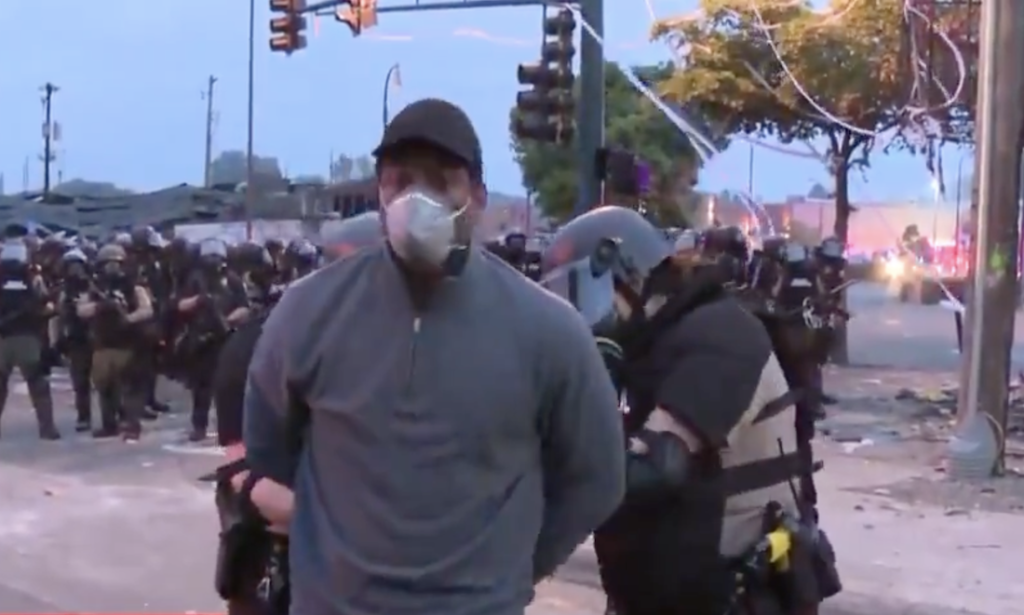
The August raid by local police on the newsroom of the Marion County (Kansas) Record and the home of the publisher no doubt shocked many Americans, including nearly every journalist. Police seized the paper’s electronic news-gathering equipment and reporting materials. At the home of the editor and publisher, Eric Meyer, they seized computers, his cellphone and the home’s internet router, and they photographed his personal bank account information. His 98-year-old mother Joan, who lived at Meyer’s home, died of cardiac arrest the next day, and Meyer blamed her death on the stress of the raid.
After public condemnation by at least 36 media organizations and other groups, the prosecutor in Marion County withdrew the search warrant and asked police to return the seized material, and the judge who issued the search warrant has been asked by the state Commission on Judicial Conduct to explain her action. But this invasion of a newsroom represents a dangerous escalation in the ongoing assault on press freedom in the U.S.
While Meyer said the raid was prompted by a dispute between the paper and a local business person (who Meyer has said lied), he also told reporters that he thinks the paper’s aggressive coverage of local politics played a role as well. For one thing, Meyer noted, the paper had recently been looking into the past history of Marion Police Chief Gideon Cody, who led the raid.
Penny Muse Abernathy, a visiting professor at Northwestern’s Medill School of Journalism, told NPR recently that papers like the Record play a vital role in their communities. “For 200 years, we have relied on a network of thousands of small newspapers, just like the Marion paper, to both hold local officials accountable and also to provide transparency around government actions,” she said.
Marion County resident Whitney Douglas told NPR, “If the police get to control what information we are allowed to know about, then where does that take us as a culture?”
In the U.S. (as in other countries), the risks involved in doing journalism have been steadily increasing in recent years. According to the U.S. Press Freedom Tracker, since it began keeping records in 2017, there have been a total of 981 physical assaults on journalists in the U.S., including 629 incidents of journalists assaulted by police and 315 instances of journalists being shot or shot at by someone. Also since 2017, the Tracker reports that there have been 286 incidents where a journalist was arrested, 211 cases where a reporter’s equipment was damaged, and 196 instances where a journalist or news organization was subjected to a subpoena or legal order. There were also 89 incidents involving search or seizure of equipment, such as the case of the Marion County Record.
Other types of incidents since 2017 included 51 instances of journalists being stopped at the U.S. border “and subjected to secondary screening, which can include prolonged or invasive questioning about their journalistic work, electronic device searches or demands for device passwords.” The Tracker has also recorded these types of incidents since 2017: chilling statements (public threats made to reporters and media organizations by U.S. politicians and other public figures, which can cause journalists to self-censor) (54 since 2017); and denial of access to government events that are traditionally open to the press (81).
The Tracker also reports that the assaults on the press, especially by police, skyrocketed after the murder of George Floyd in 2020 when there was an upsurge in the Black Lives Matter protests.
The attack on the press takes other forms as well, including search engines and social media platforms altering their algorithms to limit readers’ access to certain online publications. The Intercept recently reported that in a single year, their Facebook traffic dropped by 53%, and the number of visitors from their own Facebook page dropped by 83%.
And of course reining in the press is just one part of an overall effort by the powerful to limit free speech, especially the right to protest (witness the recent indictments of Cop City opponents in Georgia, including some who were charged simply for handing out leaflets).
You can’t have a real democracy without accurate information about what’s going on, and a free press is critical to getting that information. As the famous American broadcast journalist Walter Cronkite (1916-2009) once said, “Freedom of the press is not just important to democracy, it is democracy.”
It should be no surprise that democracy, including a free press, is under attack in a time when the corporate-dominated economy is failing and millions are struggling just to survive and to defend their basic human rights. Those presses that are independent of the corporations are especially important in the fight to create a real democracy in America and a society that takes care of everyone and protects everyone’s rights. The corporate-owned media cannot ultimately be relied on to defend the interests of the people in a time such as this – those media defend the interests of the corporations. And while we defend every journalist that is unjustly attacked, defending independent journalists like Julian Assange is critically important. He has received virtually no support from the corporate media.
Millions of people are standing up to defend the First Amendment right to speak and publish. This is encouraging, but millions more need to join the fight to both defend and expand democracy. The billionaires and corporations are serious about silencing the people. If we lose our right to speak, to publish and to protest, that will truly mark the end of democracy.
Bob Lee is a professional journalist, writer and editor, and is co-editor of the People’s Tribune, serving as Managing Editor. He first started writing for and distributing the People’s Tribune in 1980, and joined the editorial board in 1987.

